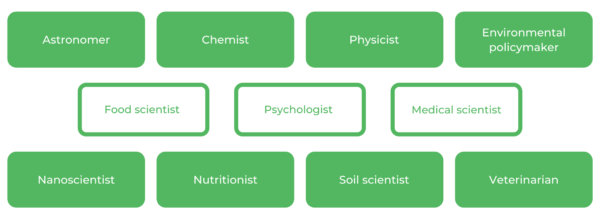
Have you ever wondered how studying a Bachelor of Science at USYD is really like from a student’s point of view?
We’ve asked Bill, a Bachelor of Science graduate from USYD to share his own experiences and thoughts about studying this degree!
What are we waiting for? Let’s spill the tea!
Why should you study a Science degree at USYD?
Top 3 Pros of a Science Degree
Top 3 Cons of a Science Degree
Mistakes You Shouldn’t Make
Things to Know Before Starting USYD Science
What Makes this Degree Different
Motivations for Studying USYD Science
Potential Career Paths
Why should you study a Bachelor of Science at USYD?

USYD’s Science degree offers a wide array of majors to choose from, making it one of the most flexible degrees — you are free to test which areas of science are right for you before committing to it completely. Altogether, USYD’s Faculty of Science has over 40 majors to choose from — and this doesn’t even include shared majors from other disciplines!
USYD is also known as one of the most prestigious pioneers of Science research, coming in 3rd in Australia and 40th internationally.
Top 3 Pros of a Science degree
#1: Personalise your learning
One of the key benefits with USYD’s Science degree is its large breadth of units of study that allow you to customise your own learning experience. With its flexibility, you can find and do what you’re really passionate about!
Even so, you do need to be careful when choosing your units as some future career pathways may require you to complete certain majors. Check out how to choose your units here!
“You have a lot of options open for you! On top of that, you can pick another major outside of your discipline such as an arts, engineering or even commerce majors such as finance and accounting,” said Bill.
#2: Interdisciplinary/Multidisciplinary experience
Along with its diverse units, USYD’s Science degree equips its students with a wide variety of skills to collaborate with team members from other disciplines. Through group work, you get to work with different perspectives and practical approaches that help you become a more culturally competent leader or team-worker!
“A lot of the courses I’ve done have been very interdisciplinary and multidisciplinary which brings in many different points of views. For example, we learn skills that are outside of our scientific area while engaging with other perspectives to work on a problem,” said Bill
Through being exposed to different points of view and work styles, this degree helps you to adapt to any situation real life throws in your way! This is especially important in an ever-changing world with problems that are never simple or the same everyday.
#3: Enthusiastic staff
USYD is known for its high class teaching, so it’s no surprise that its science lecturers and tutors are highly passionate and engaging! Science students at USYD generally feel supported by the staff who are very open and eager to guide you, so don’t feel afraid to ask questions in online forums or during tutorials and labs.
“In general, I feel very supported because most lecturers from the units I’ve attended have really been supportive and listened to my questions and are really open to helping other students too,” Bill said.
Top 3 Cons of a Science degree
#1: Long contact hours
A science degree is notoriously known for its long contact hours, and this is the same in USYD. First years often come to campus 25 hours per week because of multiple lectures and long practical labs throughout the week, so it can get really tiring.
“In the first year, you can get really tired after travelling to the city almost four times a week, especially after those 3 hour practical labs,” Bill said.
#2: Strenuous assessments
“Some units can have some taxing and unnecessary assessments,” Bill commented. At times, students are required to complete after-class assessments that are weighed 3% on a weekly basis, alongside with their many assessments to keep up with.
Moreover, these assessments may be completely different to your course content. “In my experience, we had a whole semester being project based and we had a random final exam on coursework. It can make the assessments over strenuous and at times very unnecessary,” Bill said.
#3: Open-ended assessments
To instil independent and critical thinking, USYD does not spoon-feed answers and solutions for its students.
This means that Science students often need to refer to extra readings, online forums and educational videos to excel in their assessments! Sometimes, these answers cannot be found anywhere else, so it really comes down to your creativity in delivering new, interesting ideas!
“I do acknowledge that many assessments were open-ended and that sometimes it was difficult to look up answers or find the best way in completing a task. It was a bit frustrating when asking for confirmation on specific content,” Bill said.
Despite the hard work, independent learning is ultimately beneficial for refining long-term skills! “It is actually great to develop your thinking and problem solving skills — USYD’s mode of teaching really helps you develop a ‘mental bank’ of informed decisions when responding to a scenario,” Bill added.
Any regrets?
“No, I feel like my experience has been very good and it has been very rewarding!
I feel so intellectually rewarded and I learnt so much, not just in my major but in other areas too that are important to my discipline. I’ve also learnt things outside of my discipline areas that are personally useful too and had a lot of social and academic opportunities to do further research as well,” said Bill.
What do you wish you had known before starting Science at USYD?
#1: Research your majors!
Since USYD’s Science faculty has a large variety of majors to choose from, Bill recommends that research into these majors and its core units are really useful in preparing you for what’s ahead. Some future studies or career pathways require certain prerequisite subjects, so it’s good to do a little research into what you need to enrol in for the years ahead!
“It’s good to research all available options and how you’re going to design your degree. This includes looking into all these core units — what avenues and what majors we can do. We have to do our own research because it is really tailored to your interests,” Bill said.
#2: Research your scholarships!
USYD also provides many opportunities such as scholarships, internships, summer research programs, extra-curricular activities and more that are beyond coursework but they can be hard to find so be sure to do your research!
“I wish I had known that there are a lot of opportunities you can get into such as the Denison Summer Research Program and mentorship programs,” Bill said. “Some avenues may even have work experience, internships and extracurricular activities available to enrich your university experience!”
What makes this degree different from the ones offered at other universities?
#1: The Breadth of Majors
“If you want to do two passions that are completely different, you might need to do a double degree in another university but USYD allows you to do two different majors in one degree,” Bill said.
USYD’s breadth of studies really provides its students with the flexibility of designing their own study. With over 40 majors from USYD’s Faculty of Science and more from other disciplines to choose from, students can decide to do double majors in Science or pick on from Science and another discipline such as Commerce, Arts and more!
“I ended up doing units that I did not expect to do in a science degree,” Bill added. “I got to dip my toes into European studies, Forensic Science, Psychology and even Philosophy!”
#2: Be part of the research team
USYD provides front row seats for its students to experience Science first hand! With programs such as the Denison Summer Research Program and the Year In Industry program, students get to work with professionals in the field and help solve real-life science problems!
“You get to be hands on with actual research programs at USYD! In my experience with the Denison Research Program, I worked with USYD Science staff to try and alter the rate of browning in mushrooms using genetics,” Bill said. “I actually learnt what real research is like!”
What inspired you to choose Science at USYD?
Initially, Bill was planning to study in Melbourne to have a new start in life. “I actually had no intention of doing this degree — I really wanted to move to Melbourne and start an independent life,” Bill said.
Due to personal reasons, Bill had to study in Sydney. “I’m not a scientifically oriented person and I like to engage in other areas because that’s just who I am. So, when I was choosing the Bachelor of Science, I didn’t really think it would suit me. But when I went into it, I was really wrong! I realised I had these options available and I could choose so many things,” Bill commented.
What are the possible career paths?

Many assume that a Bachelor of Science will just land you a job in the lab; but it’s far from that! With the many different knowledge and skills you learn, you’ll be equipped to work in many areas of science and beyond.
Within the traditional sciences, you can become an ecologist, chemist, mathematician, physicist and more. As USYD also provides the opportunity to study more niche sciences, this degree opens gateways to careers as plant geneticists, veterinarians, biosecurity researchers, nanoscientists, nutritionists, psychologists etc!
You can also choose to further specialise your studies, just like Bill who will be pursuing his Masters of Nutrition and Dietetics following his Bachelor of Science degree!
Kate Lynn Law graduated in 2017 with an all rounders HSC award and an ATAR of 97.65. Passionate about mentoring, she enjoys working with high school students to improve their academic, work and life skills in preparation for the HSC and what comes next. An avid blogger, Kate had administered a creative writing page for over 2000 people since 2013, writing to an international audience since her early teenage years.


